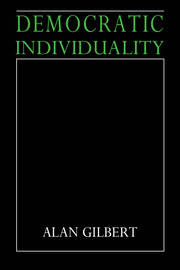Conclusion: the project of democratic individuality
Published online by Cambridge University Press: 05 June 2012
Summary
If we imagine the disciplines of scientific and moral epistemology, ethics, social theory, and political theory as a series of steep hills, only partly visible to one another, then you and I, dear reader, have traversed a long, sometimes tortuous trail of arguments across them. Having reached a stopping place, we should now survey the terrain we have covered.
Older scientific epistemologies placed moral knowledge in doubt. So did cultural relativism. Leading figures in contemporary moral and political philosophy – Rawls, Walzer, Williams, Berlin, Taylor, Wiggins, Miller, Popper, and many others – have glimpsed, and then lost sight of, the integrity of ethics. The ascent from moral judgment to ethical epistemology has somehow made even such elementary points as the injustice of slavery, serfdom, sexism, tyranny, colonialism, fascism, rape, and murder obscure. murder obscure.
Yet several philosophers of science – Richard Boyd, Peter Railton, Nicholas Sturgeon, David Brink, Dudley Shapere, and Hilary Putnam – have undermined the older contrasts of scientific and ethical epistemology.
- Type
- Chapter
- Information
- Democratic Individuality , pp. 467 - 471Publisher: Cambridge University PressPrint publication year: 1990



